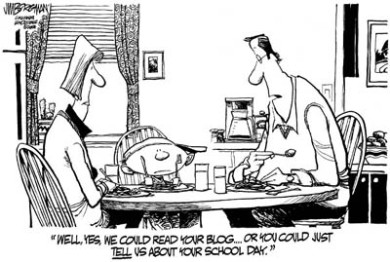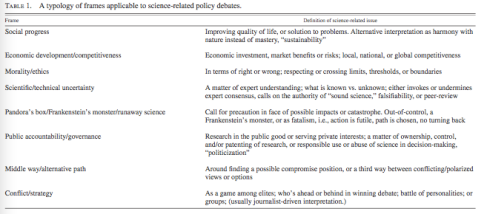“Dawkins, for example, argues as a scientist that religion is comparable to a mental virus that can be explained through evolution, that religious education is a form of child abuse, that religious believers are delusional, and that in contrast, atheists are representative of a healthy, proscience mind.”
This quote, taken from ‘What’s next for science communication? promising directions and lingering distractions’, highlights the need for science communication to take a more scientific approach in more modern medias. the above quote is specifically an example of how one scientist can promote the division between the scientific community and the lay public with his own agenda.
Essentially it’s ‘what not to do’ in science communication.
The article looked at the way framing can be used by scientists to communicate their work. framing is described as an ‘unavoidable reality’, and so it can be used to motivate and generate interest in the general public. Specifically the article looked at the ‘future of science communication and the way we can use framing in new forms, such as digital media (e.g. BLOGS.). The use of modern media is undeniably a powerful force shaping the publics opinion.
The article looks at how the correct use of framing can help the science communication process. So instead of fuelling debate and isolation of the scientific community- like the above quote does so well- we could use certain frames. the above quote was to promote the teaching of evolution in schools (more of an attack on religion really), a more successful method could be using a ‘social progress’ frame. To show how evolution is the modern ‘building blocks for advances in science and agriculture’.
More frames can be seen below, and each could be used to present certain scientific topics to the community:
The future of science communication relies on using more modern forms of media (like our blogs) and to really promote scientific knowledge to the public a more scientific approach needs to be taken (tell the ACTUAL SCIENCE). To help in understanding this ‘actual science’ a public dialogue should occur to encourage public participation.
Finally, to get a public dialogue and participation it is important to connect to public values… otherwise why should anyone care?
Do you think this is true? my personal response to this last notion is that despite the importance of connecting to public values it is also important to create and shape public values. Not to the extent that we are ‘telling people how to think’ but definitely to promote certain important scientific concepts that may become important to the public through our communication. What are your views on this? is it unethical? is it essential?
Reference:
-
Matthew C. Nisbet and Dietram A. Scheufele ‘WHAT’S NEXT FOR SCIENCE COMMUNICATION? PROMISING DIRECTIONS AND LINGERING DISTRACTIONS’ American Journal of Botany 96(10): 1767–1778. 2009.


Good post. I was attracted by the title and such an interesting quote.
It reminds me a story a friend just told me earlier today. She knew a guy who became very religious several years ago, and he believe that the world was created about 6000 years ago as the Bible says (I don’t know if it’s true). So she asked his opinion of archaeological findings. Surprisingly, without any doubt, he said using isotope’s half-life to determine geological age is not reliable.
So, I very agree with you that “telling people how to think” is not enough. Different from we think, people CAN live without science. For us, probably science is everything, while for them, it’s just a topic at dinner table.
But with the new technology and media, it’s easier to get a topic go viral. Media can influence people “when to think” (priming) , “how to think” (framing) , and “what to think first” (agenda-setting). I believe that media can help science to be communicated better in the new age.
Religion and science is a extreme pair, controversial and contradictory. But I still remember an idea I read from somewhere that “religion and science are just telling the same story in two different languages”, and I think it’s really profound and right. And we are more likely the translators; we can’t destroy a language just for speaking the other one right.
Hey Axl,
Thanks for your comment!
In response to the religion vs science thing I don’t believe they are mutually exclusive beliefs, I’m personally not religious but I don’t think believing in god means that all science must be a lie and vice versa. As far as I know the bible doesn’t ever explicitly say when the world was created, I’ve heard the ‘6000 years’ theory before but I also am unsure about where this number comes from! I liked your analogy of ‘2 languages and the same story’.
I have to wonder about your friend of a friend, why be so sceptical of carbon dating? Why not be sceptical of the 6000 years? This just highlights the importance of science communication I guess.
I’ve never really though of science from the angle of someone like you described, someone with absolutely no involvement, but once again It’s these people who need science to be communicated, and not just scientific ‘suggestions’ but real science, presented in a way which can mean something to them and help to shape their ideologies.
Well said Zoe! This aspect of “what not to do” is important in science communication. It is not scientific (or professional) to attack another school of thought and pursue a personal agenda. Rather it would be better to provide the facts and support the findings of one’s own position, engaging the audience with an objective critique of apparent contradictions in current knowledge, as knowledge is ever changing and what was true yesterday may not be applicable anymore today. As a member of the public it is hard for me to respect and accord credibility to someone who churns out comments framed like the one in the beginning of your post. I personally feel that science and religion both exist as having complimentary roles in human life.
As to your final question, I do think it is important to connect to the shared public values, it gives more relevance to the communication process, and it will help shape public values, without being dogmatic about it. At the end of the day humans have individual free will and choice, but choices need to be made based on knowledge and experience from which science plays a vital role.
Absolutely we need to shape public values based on science otherwise there are plenty of other people/organisations that would like to shape them on less reasonable grounds.
The best and worst aspect of the internet is that everyone has a voice. Unfortunately those who have the most to lose from scientific ideas (be it money or ideology) will undoubtedly be the ones with the loudest voices. Who exactly do we expect is going to have the time (and money) to reframe all these issues and project them to an equal magnitude?
And would it be worth it? Creationists are so because they need something to shield them from existential dilemmas. Will there ever be a scientific frame powerful enough to match transcendence? It would have to be epic.
Certainly starting with neutral grounds on public values will help science gain more support. It really does get tricky when those values include censoring Harry Potter because he is an agent of satan! (if this sounds strange then you haven’t seen Jesus Camp). This, really, is what Dawkins is up against and I can understand if the most preeminent evolutionary biologist is so…let’s say…passionate about religious organisations censoring his entire field of expertise from high school education in a (supposedly) progressive country like the USA.
Maybe it’s not Dawkin’s job as a science communicator to make sure the word ‘evolution’ is printed in high school textbooks. In any case his quote from your post was pretty inflammatory. This language would have certainly created divisions between religion and science rather than just uniting us all as people.
Better said than never. Enjoyed your sense of humour, Zoe.
The final question you posed I believe is the key messege of the post.
“to get a public dialogue and participation it is important to connect to public values… otherwise why should anyone care?”
Afterall, for science communication to reach its next level or maximize its influence, the public should always be the targetted audience. The key messeges, it doesn’t matter how sciencey it may be, should always aim at educating the public. Science knowledge is for the public and thats the bottom line. Otherwise, what would be the use of communicating science?